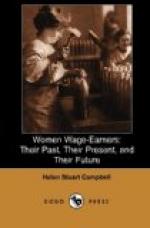Wales, women in industries in, 160.
Walker, Gen. F.A., on differences in efficiency, 14;
difficulties of census enumeration, 104.
Ward, Lester F., 26.
Wealth, ratio of increase greater than that of population,
8;
greater aggregation of, in the United
States than in Great Britain, 9.
Weavers of Baltimore, 81.
Weaving, colonial, 60.
West Virginia, working-women in, 110.
Widows, proportion of, among other workers, 118.
Windows, nailing down of, 62.
Wisconsin, average wage in, 141;
working-women in, 110.
Wives’ earnings, 113.
Woman, primeval, 27;
Roman, 36;
property of, 52;
petition of, in France, 55;
International Council of, 79.
Women-workers, percentage of, in Philadelphia, Pittsburg,
New York,
Lowell, Manchester, Wilmington, Del.,
108, 109;
according to States, 110;
of Boston, 114, 116;
industries open to, in large cities, 124;
development of her intelligence necessary,
251;
in German mines, 11;
why their wages are less than men’s,
14;
their trades highly localized, 19;
entrance into trades barred by men, 20;
increase of, in the United States, 98;
total numbers of, in the United States,
in 1860, 103;
in 1870, 105;
in 1880, 105;
occupations according to Census of 1880, 106.
Woollen and cotton industries, 98, 108.
Working-girls’ clubs, conditions of, 257.
Working-Woman’s Journal, 255.
Working-Women’s Protective Union, 255.
Working-Women’s Society of New York, its aims, 256.
Worsted and woollen trades, women and children in, 108.
Wright, Carroll D., 115.
Wyoming, working-women in, 110.



